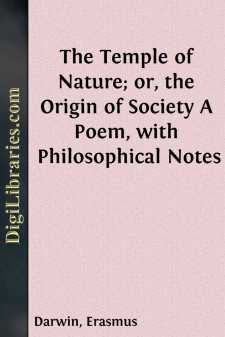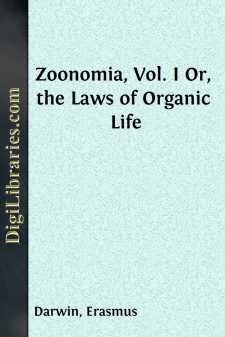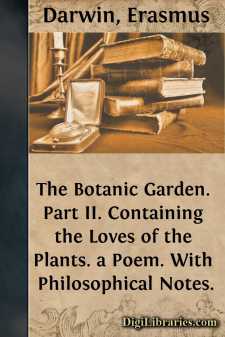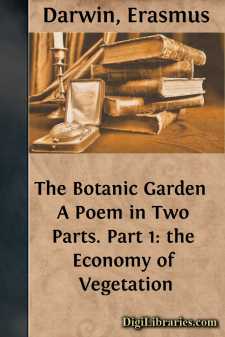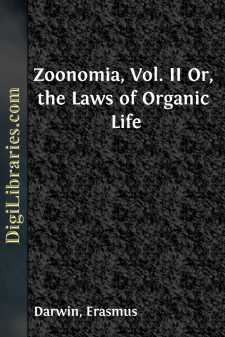Categories
- Antiques & Collectibles 13
- Architecture 36
- Art 48
- Bibles 22
- Biography & Autobiography 813
- Body, Mind & Spirit 142
- Business & Economics 28
- Children's Books 16
- Children's Fiction 13
- Computers 4
- Cooking 94
- Crafts & Hobbies 4
- Drama 346
- Education 46
- Family & Relationships 57
- Fiction 11829
- Games 19
- Gardening 17
- Health & Fitness 34
- History 1377
- House & Home 1
- Humor 147
- Juvenile Fiction 1873
- Juvenile Nonfiction 202
- Language Arts & Disciplines 88
- Law 16
- Literary Collections 686
- Literary Criticism 179
- Mathematics 13
- Medical 41
- Music 40
- Nature 179
- Non-Classifiable 1768
- Performing Arts 7
- Periodicals 1453
- Philosophy 64
- Photography 2
- Poetry 896
- Political Science 203
- Psychology 42
- Reference 154
- Religion 513
- Science 126
- Self-Help 84
- Social Science 81
- Sports & Recreation 34
- Study Aids 3
- Technology & Engineering 59
- Transportation 23
- Travel 463
- True Crime 29
Erasmus Darwin
Erasmus Darwin (1731–1802) was an English physician, poet, and natural philosopher, known for his progressive ideas on evolution and natural history. He was the grandfather of Charles Darwin and influenced early evolutionary thought with works like "Zoonomia," where he discussed the development of species over time. Darwin also wrote "The Botanic Garden," a poetic work that combined scientific ideas with verse. In addition to his scientific contributions, he was a key figure in the Lunar Society, a group of prominent thinkers and industrialists during the Enlightenment.
Author's Books:
Sort by:
by:
Erasmus Darwin
CANTO I.PRODUCTION OF LIFE. I. By firm immutable immortal lawsImpress'd on Nature by the Great First Cause,Say, Muse! how rose from elemental strifeOrganic forms, and kindled into life;How Love and Sympathy with potent charmWarm the cold heart, the lifted hand disarm;Allure with pleasures, and alarm with pains,And bind Society in golden chains. Four past eventful Ages then recite,And give the...
more...
by:
Erasmus Darwin
SECT. I. OF MOTION. The whole of nature may be supposed to consist of two essences or substances; one of which may be termed spirit, and the other matter. The former of these possesses the power to commence or produce motion, and the latter to receive and communicate it. So that motion, considered as a cause, immediately precedes every effect; and, considered as an effect, it immediately succeeds every...
more...
by:
Erasmus Darwin
THE LOVES OF THE PLANTS. Descend, ye hovering Sylphs! aerial Quires, And sweep with little hands your silver lyres; With fairy footsteps print your grassy rings, Ye Gnomes! accordant to the tinkling strings;5 While in soft notes I tune to oaten reed Gay hopes, and amorous sorrows of the mead.— From giant Oaks,...
more...
by:
Erasmus Darwin
Oft tho' thy genius, D——! amply fraughtWith native wealth, explore new worlds of mind;Whence the bright ores of drossless wisdom brought,Stampt by the Muse's hand, enrich mankind; Tho' willing Nature to thy curious eye,Involved in night, her mazy depths betray;Till at their source thy piercing search descryThe streams, that bathe with Life our mortal clay; Tho',...
more...
by:
Erasmus Darwin
PREFACE. All diseases originate in the exuberance, deficiency, or retrograde action, of the faculties of the sensorium, as their proximate cause; and consist in the disordered motions of the fibres of the body, as the proximate effect of the exertions of those disordered faculties. The sensorium possesses four distinct powers, or faculties, which are occasionally exerted, and produce all the motions of...
more...


